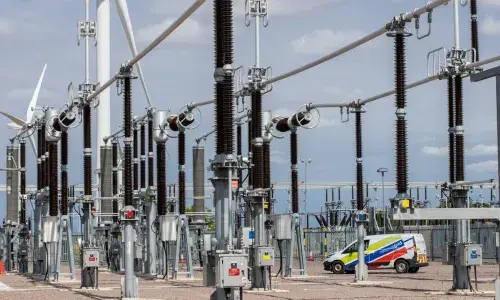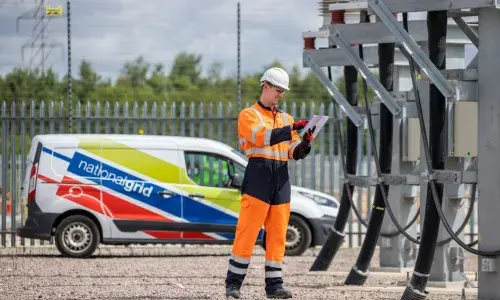
Code modifications - transforming the energy networks of the future
The code modification process is crucial to facilitate short and long term policy reform of the Great British energy sector. It is instrumental in ensuring networks remain fair, economic and efficient, whilst laying the ground for the delivery of net zero strategy. Richard Woodward from our Electricity Transmission Commercial Strategy team explains what the codes do and how they’re modified, ahead of potential reform to these processes over the next few years.
What are the industry codes?
The industry codes ensure that the energy sector functions correctly. The various codes (listed below) set compliance obligations on industry parties, e.g. National Energy System Operator (NESO), network owners (including us), and system users (e.g. generation or demand), to undertake their activities effectively.
The primary codes governing electricity transmission include:
- Connection & Use of System Code (CUSC) – the commercial arrangements for connecting to and using the electricity transmission network.
- Grid Code – the technical and safety requirements for system users to use the electricity transmission system.
- SO/TO Code (STC) – manages the interaction between the NESO and the transmission network owner licensees (Onshore TOs and OFTOs) covering all network activity from real-time operation to connections.
- Balancing & Settlement Code (BSC) – the processes to facilitate the electricity market, including trading and financial settlement processes.
When aspects of the codes become outdated or can be improved by evolving arrangements, changes can be made. Each code has its own independent administrator who oversees the process of making changes through code modifications.
What is a code modification and why is it important?
The code modifications process enables industry stakeholders to propose solutions on how to improve the existing code frameworks.
All code changes should better enable the electricity sector to operate efficiently, economically and fairly, whilst facilitating competition, protecting consumers, and working towards net zero.
All modifications proposed should aim to achieve those objectives listed above.
How is a code modification developed?
The codes governance process enables anyone who complies with the codes (a ‘code party’ such as National Grid Electricity Transmission), or those impacted by the codes (e.g. trade associations or bodies like Citizens Advice), to be able to raise a modification proposal.
The code modification proposal is reviewed by the relevant code panel, who decides how the proposal should be developed, recommending ‘terms of reference’ for any industry working group (if needed). The panel cannot veto proposed changes but can agree which modifications are a priority if industry resource is restricted.
Most code changes require working groups to be established. These groups consist of interested parties and relevant experts to help the proposer fully develop their solution. During this process the workgroup membership can also propose their own alternative solutions. These alternatives are formalised via a working group vote and are developed in parallel to the proposer’s solution.
Once solution design is almost complete, the workgroup shares its findings with industry via a consultation. They consider any points raised in the consultation responses before each voting on their favoured solution option, or to retain the status quo.

How does the code modification process conclude?
After a further industry consultation issued by the code administrator, the code’s overseeing panel provides its own recommendation via a vote on the various options (including status quo). The code modification is then issued to Ofgem who make the final decision on the potential change based on the information presented. There is no time limit on this decision, and it varies depending on the complexity of the modification.
Ultimately Ofgem have three types of decision they can make:
- Approve the change and direct the Code Administrator to implement it.
- Reject the change.
- Send the modification back through the code change process with instructions to gain further information before resubmission for a decision.

Is the current code modification process effective?
The consensus amongst industry is that the code modifications process is not always efficient, fully accessible or focused on long-term policy needs. Some fundamental reform therefore may be needed - not only to the contents of the codes themselves, but their overseeing arrangements.
Since 2019, Ofgem and the Department for Energy Security and Net Zero (formerly BEIS) have consulted on a review of the codes and their governance processes (‘Energy Code Reform’). Their objectives for this reform are:
- Ensuring the codes are forward-looking and closely informed by the government's legislative vision.
- Improving governance practices to more swiftly enable codes to change according to energy policy.
- Improve accessibility to the codes and their arrangements to all impacted parties, particularly new entrants, to foster innovation.
At National Grid Electricity Transmission (NGET), we support reform, which will demonstrably improve the efficiency, the accessibility and strategic direction of code arrangements without causing undue disruption to the day-to-day operation of the energy sector.
NGET’s stance on important ongoing code changes
At any one time, there may be tens of modifications in active development across each of the codes. Given the breadth of their focus, not all changes affect industry parties equally. We’ve provided a list of a few examples of ongoing code changes, which we are significantly engaged in due to their positive impact on our business, wider industry, and most importantly end consumers (see table below).
For other code changes that directly or indirectly impact us or our customers, it might be that the benefits are more difficult for us to ascertain. Therefore, where necessary, we will actively engage with modification working groups to ensure that any benefits are evidenced, whilst also flagging options to mitigate any adverse implementation impacts we have identified. We believe our input ultimately allows Ofgem to make a more comprehensive decision on whether to approve code changes or not.
| Mod Name | Code | Stage | Short Summary | NGET stance |
| CMP376 – Queue Management | CUSC | Code Admin Consultation open - click here to read | Introduces stronger management of transmission customer projects so they progress efficiently, ideally in line with network investment. If customer projects stall or are no longer viable, the enhanced policy will enable these projects to be removed from the connection pipeline to allow others to proceed. | Supportive |
| CMP288 – Delay Charges | CUSC | Awaiting Ofgem decision | Seeks to enable customers to understand the cost of delaying their projects by introducing explicit arrangements to recharge unanticipated or unavoidable costs to customers who want to delay their connection. | Supportive |
| CMP298 Transmission Impact Assessment | CUSC | Awaiting Ofgem Decision | Proposes an enhanced methodology for assessing the transmission network impacts of connecting new distribution users by aggregating capacity requirements. This is intended to create a more efficient process for connection customers. | Supportive of intent – wary over potential implementation challenges re. operational data |
| CMP328 Distribution Impact Assessment | CUSC | Sent back to workgroup | Proposes a more proportionate capacity threshold methodology for triggering a distribution network impact assessment due to a new transmission connection. This is intended to create a more efficient process for connection customers | Supportive of intent – wary that some workgroup alternatives may be challenging to implement |

